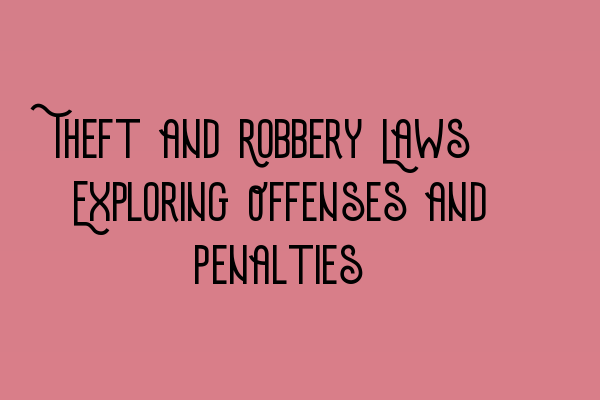Theft and Robbery Laws: Exploring Offenses and Penalties
Welcome to SQE Criminal Law & Practice Law UK! As expert solicitors specializing in criminal law, we understand the intricacies and complexities of theft and robbery laws in the UK. In this blog post, we will dive deep into these offenses, their definitions, and the penalties associated with them.
Theft
Theft is a serious criminal offense that involves the unauthorized taking of another person’s property with the intent to permanently deprive them of its possession. Under the Theft Act 1968, the offense of theft is defined as:
“A person is guilty of theft if he dishonestly appropriates property belonging to another with the intention of permanently depriving the other of it.”
Key elements of theft include dishonesty, appropriation, property belonging to another, and the intention to permanently deprive.
Penalties for theft vary depending on the value of the stolen property and the severity of the offense. If the theft involves property valued at less than £500, it is considered petty theft and is punishable by a fine or imprisonment for up to 7 years. For theft involving property valued at £500 or more, the offense is considered a serious crime and can lead to a maximum sentence of imprisonment for up to 14 years.
Robbery
Unlike theft, robbery is a more severe offense that involves theft along with the use or threat of force. In this case, the offender uses force or the threat of force to steal the property directly from the victim. Robbery is considered an aggravated form of theft due to the additional element of violence or intimidation.
Under the Theft Act 1968, the offense of robbery is defined as:
“A person is guilty of robbery if he steals, and immediately before or at the time of doing so, and in order to do so, he uses force on any person or puts or seeks to put any person in fear of being then and there subjected to force.”
Robbery is a serious criminal offense and carries a maximum penalty of life imprisonment. The severity of the offense and the actual sentence depend on various factors such as the level of violence used, the harm caused to the victim, and any aggravating or mitigating factors.
It’s crucial to have strong legal representation when facing theft or robbery charges. Our expert solicitors at SQE Criminal Law & Practice Law UK are well-equipped to handle such cases and provide you with the best possible defense. We are experienced in protecting the rights of individuals accused of theft and robbery.
For more information on legal representation for Delaware LLCs in the UK, check out our Expert Advice article.
If you’re interested in learning about ethical business practices, you should definitely read our article on Delaware’s Code of Conduct.
Are you a UK business facing legal challenges in the United States? Our article on Strategies for Overcoming Hurdles can provide you with valuable insights.
Preparing for the SQE exam? Our Essential Study Materials for Aspiring Solicitors article has got you covered.
Thank you for reading this comprehensive blog post on theft and robbery laws. If you have any questions or require legal assistance, please don’t hesitate to contact us. Our team of expert solicitors is ready to assist you.
